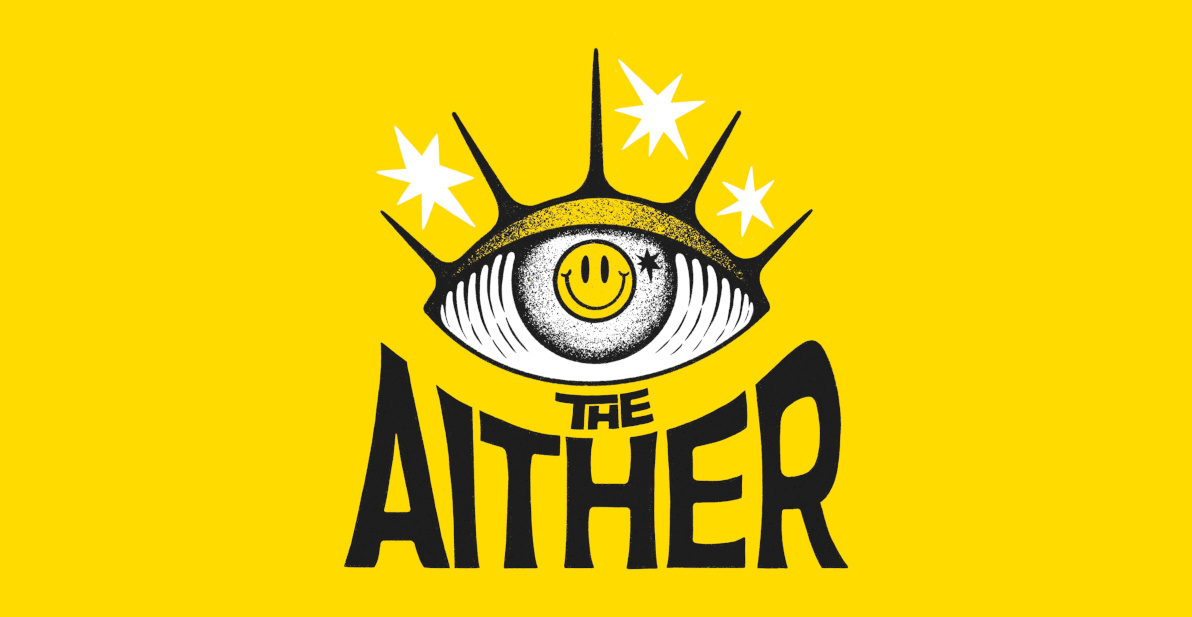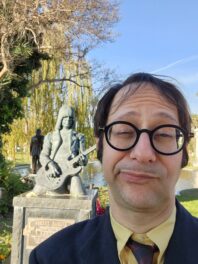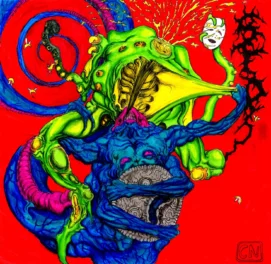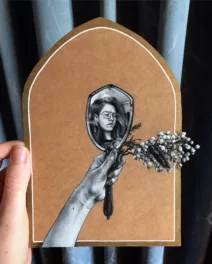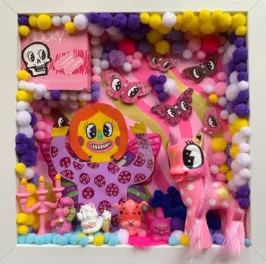Born in the American city of Seattle in 1972, Damian Murphy creates deliciously decadent, occult influenced fiction that draws from his personal practice and the long tradition of esoteric literature. With his works being released in limited, artisanal editions by admired publishers such as Mount Abraxas Press, as well as in mass market editions by Snuggly Books. His writing having won him a devoted and even fanatical global fanbase.

Recently, Damian has also become a key player in the Neo-Decadent Movement. Contributing to various anthologies and developing a close bond with the movement’s main spokesman, Justin Isis. Placing him at the very centre of the current underground scene.
Wanting to peel back the layers behind the man, we sent Damien some questions to answer over email.
Take a glimpse behind the curtain, below…
Getting Acquainted
Name and date of birth?
Damian Murphy.
August 7, 1972
City, state, and country you currently call home?
Seattle, Washington, US
City, state, and country you’re from?
Same.
There are advantages to living in a single city throughout the course of your entire life. The city resides in my bones. I know it as well as I know myself.
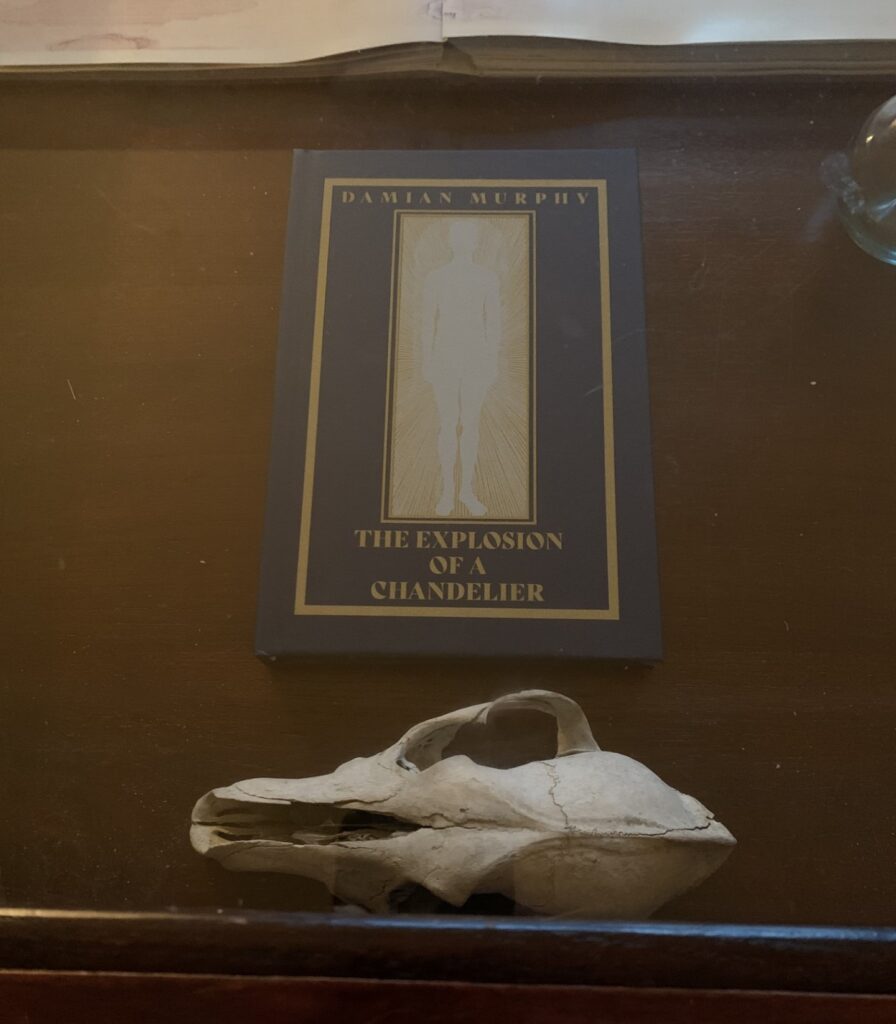
Please describe some memories – such as art, music, writing, friendships, adventures, study, romance, politics, religion, film, travel, work, crime… anything really – from the stages of your life noted below:
* Your childhood:
My long-term memory has been described as ‘spooky’ by more than one person. On the other hand, memory is deceptive – as a character in one of my stories puts it, “memory is the oracle that lies.” Memories of childhood are largely mythological.
Like any myth, they’re generally ripe for excavation. Jean Cocteau got a tremendous amount of mileage out of a single memory of a snowball fight.
Intentionally approaching your youth as a series of myths can reveal dimensions of experience that may be otherwise inaccessible.
I have a distinct recollection, from when I was four, of playing on some monkey bars with a friend. The central conceit of our game was that there were bombs down beneath the monkey bars. As we crawled, walked, or swung from the bars, it was imperative that we didn’t fall.
At some point, my friend looked over at me with deadly serious eyes and said “Don’t follow me down here.” With that, he let himself fall into the bomb field and pretended to die. I remember being so baffled by this that it made me question everything I thought I knew about the world.
I desperately tried to understand, as I laid awake over the following nights, by what logic his action could possibly have made sense, gradually convincing myself that there was a hidden order behind the façade of human behaviour that could only be understood by the most disparate chains of association. This was confirmed in one thousand different ways over the years to come, and even adapted into my own behaviour, if only in accordance with particular stratagems employed to meet certain ends.
The incident left such a mark on me that I adapted it for the opening scene in my book The Explosion of a Chandelier. As is inevitably the case, the scene quickly morphed into something entirely different, but the seed of my earlier experience remains.
* Your teenage years:
The single most significant feature of my teenage years was LSD.
Before the first time I’d taken it, a friend who was extolling its virtues removed a folded-up piece of notebook paper from his pocket, unfolded it, and informed me that the artwork on its surface, which was entirely rendered in inconsistent blue ink from a cheap ballpoint pen, was created under the influence of the drug.
What I saw was a revelation. While technically not tremendously skilled, the mosaic was meticulously executed, every square inch of the paper being filled with faces, bodies, swirling lines, and interwoven semi-symmetrical latices. I was given the sense of a higher order that was not quite tangible to the rational mind.
The idea that you could ingest a substance and that it would somehow unleash your creativity in a new way was tremendously influential for me.
Shortly after this, I started regularly taking LSD myself and found that, indeed, it did unleash a torrent, not only of creativity, but also of pure intuition, allowing me to understand both myself and the world in radical new ways. Much of the rest of my teenage years were dedicated to visual art and psychedelic substances.

* Your 20s:
Somewhere between my 20th and 21st years, a lifelong obsession with theurgy, mysticism, and occult practice came to life within me as if with the flick of a light switch. Suddenly, partly as a result of some experiences with LSD, I knew exactly what it was that would define the rest of my life.
I steeped myself in mystical, gnostic, and occult literature – anything I could find. Within six months, I’d started a daily practice.
Knowing that I’d have to have self-discipline in order to develop the skills I was interested in, I adhered to a fairly militaristic approach to every aspect of the work. At the same time, I began to grow fascinated with the idea of interacting with the city in ways that it was never designed for, erecting altars in out-of-the-way places and seeking out the most unlikely routes from one arbitrary space to another.
One of my favorite activities was reverse shoplifting – sneaking things onto the shelves of stores that didn’t belong there. The more incongruous the placement of these items, and the more hidden meanings could be found in my choices, the better. I’d write cryptic manifestos littered with Kabbalistic correspondences in the margins of books and sneak them into bookstores, write arcane letters and send them to random addresses, and treat apartment buildings and office blocks as cryptic puzzles to be solved using unintelligible strategies.
It didn’t matter that nobody would understand or appreciate these things; my intent was to build a relationship to my environment through exploration and undirected interaction. This had to be entirely on my own terms, though I did often engage in these activities with other people.
All of this consistently shows up in my fiction. I feel it essential that I write about people that have motivations and agendas that have never been written about before.
A couple of years after I began my occult practice, a series of remarkable coincidences led to my working with an official order, a group run by a couple who’d created a laborious and systematic curriculum derived from the rituals and teachings of The Golden Dawn. I worked with them for about five years, living at their house over the last 2 years of that period (they often had long-term students live with them).
The work was very intensive. The teaching had a very strong element of the work of G.I. Gurdjieff about it. The ritual aspect suited me perfectly – a militaristic level of self-discipline was needed in order to keep up with my assignments, which by that point was easy for me.
There were other aspects that were very difficult. Students were expected to let things go at a moment’s notice. You’d spend weeks meticulously drawing out a series of complex diagrams only to throw them in the fire when they were done.
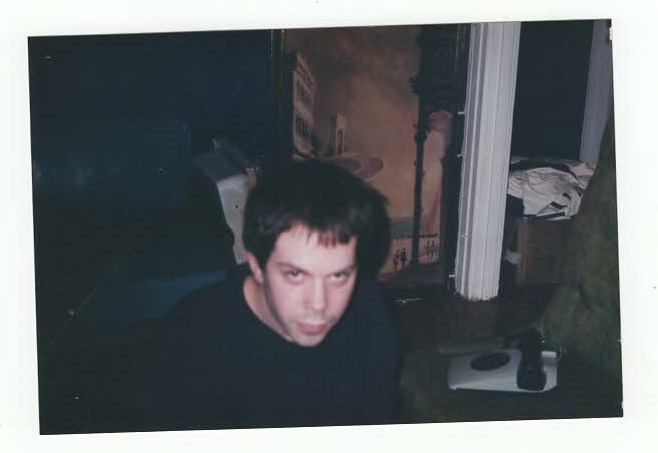
* Your 30s:
My 30s were largely defined by teaching.
I adapted the system created by own teachers (who were perfectly aware I was doing this, and approved) and started a temple of my own, eventually incorporating the Golden Dawn initiation rituals, with a little modification.
Meanwhile, my own occult work was taken to new places.
In my 30th year, a friend of mine went clairvoyant in my temple as I was showing her one of the Enochian watchtower tablets (she was curious). She ran her fingers along one of the names on one of the tablets – one that wouldn’t be identifiable without some knowledge of how the system worked, which I don’t think she had – and claimed that that particular spirit wanted to talk to me.
She agreed to take on the role of seer and a few days later I evoked the spirit while she sat before the tablet. This was the beginning of a long and fruitful relationship with countless entities (not just Enochian) that continues to this day.
The particular spirit my friend alerted me to (from the elemental Water tablet, using the GD attributions) was tremendously helpful in helping me develop a visionary capacity that vastly exceeded anything I’d been capable of before.
I regard this kind of thing as an essential component of the human experience that’s been culturally starved out of modern society.

* Your 40s:
When I was 42, I started collecting rare books from a Romanian publisher, Ex Occidente Press. At some point, he asked if I could review a book he was hoping to publish, an anthology with three authors titled Infra Noir, after a historical Romanian surrealist group. I was more than happy to do so, and reviewed a few others as well.
Shortly afterward he sent me an email asking if I had anything I’d like to submit for publication. I told him to give me two months.
I’d been writing for over a decade by that point, but never for official publication. I used to post surrealist-inspired writing on a weblog that I ran between my late 20s and early 30s and had written several short stories and a novel, all thoroughly immersed in occult themes and motifs, yet none of which I was entirely satisfied with.
In the two months following the publisher’s email, I wrote “The Salamander Angel”, which I was really happy with. It ended up being published in an expanded edition of Infra Noir.
The other authors in the book were among my favorite authors on the press – Mark Valentine, John Howard, D.P. Watt, Thomas Strømsholt, and Colin Insole. I felt like I’d been asked to put my improvised little horn solo in an Impulse Records compilation alongside John Coltrane, Miles Davis, Eric Dolphy, et al. It was a very auspicious beginning.
From that point on, I’ve never stopped writing.
I’m surprised at how much I’ve managed to put out over the years, all while holding down a full-time job, teaching, doing my own copious occult work, and nursing a long-standing obsession with psychogeography, among several other obsessions. It’s often felt like the work has been happening through me, like I’m not the one who’s really in control of the process.
I very quickly managed to develop a symbolic vocabulary that runs throughout all of my writing, which is intended to convey, in different ways with each piece, various esoteric processes and states of being. In a sense, the writing is the opposite of the teaching – they complement each other, each of them providing something inaccessible to the other.
With teaching, I’m very systematic and straightforward, where the writing is always mysterious, always based in an element of deception, always appealing to a poetic and intuitive understanding rather than a rational one. My stories are intended to work like a collection of Sufi parables as opposed to an instruction manual.

* Your 50s so far:
I feel like I’m barely into my 50s. So far, things have been much the same as my 40s – lots of occult practice, lots of writing, unflagging obsessions with psychogeography, music, art, literature, cinema.

Personal motto(s)?
I have several.
For now: “We are nothing; what we search for is everything.”
(from Hölderlin)
What role did toys play in your childhood?
… and any favourites you remember?
The best toys were the ones that encouraged exploration.
I remember, in particular, a Sesame Street house with all sorts of tunnels and chutes in it. You could drop Big Bird through a doorway and he’d come out through a window on one of the other sides. I was obsessed with what was inside the house.
I remember dreaming that I’d somehow managed to get in there and was able to explore it.
There was also a magnetic toy where you could direct a bee through a forest by magnetic attraction. There were parts of the bee’s path that you couldn’t see, which similarly obsessed me.
It’s almost too obvious to mention, but I was obsessed with stage magic for several years between the ages of 5 and 9 or so, then I graduated to video games. The Atari 2600 was a source of endless fascination.
There were games that had weird glitches that would allow you to get into unintended spaces that didn’t at all work right. It was like finding your way into another dimension. There was one called Mountain King that had a whole hidden section you could reach by jumping off of a ledge in just the right way – on reflection, this section was vaguely similar to certain classical esoteric diagrams of the Empyrean.
This kind of thing is more of an analog to occultism than many things that are officially considered occult.
Creativity Questions
When and why did you first become interested in writing and the occult?
… and any pivotal moments / influences regarding each of them?
In terms of occult practice, it started with a book by Nigel Pennick called Magical Alphabets. It covered Hebrew, Greek, Gnosticism, and the Runic alphabet. I was particularly enamoured with the latter and quickly memorized the characters and their associations, finding ways to combine them in order to discern secrets of nature, going deeper and deeper into my understanding of the root of each Rune.
The idea of an alphabet in which every letter has some kind of archetypal association immediately made sense to me.
Shortly after that, I discovered Crowley, which led me first to the Qabalah of the Golden Dawn, then the Kabbalists of Spain, the Sepher Yetzirah, the Zohar, etc. The Holy Books, the practices, the general approach to life – all of this resonated so strongly with me that it felt like I’d already known it somehow.
It was the surrealists that first got me writing, along with Yukio Mishima, Anaïs Nin, Marguerite Duras, and some others. My taste for fiction was very thin until I was well into my thirties. I spent most of my time reading occult books.
I’ve very rarely been influenced directly by occult fiction, which, for the most part, I tend to regard as a little formulaic and predictable – almost always falling far short of its potential. I have little patience for occult fiction that sticks to existing conventions. Elizabeth Jane Howard once said in an interview that, as a writer of supernatural fiction, it’s important to abide by the rules, to know you’re not cheating. When asked whether her ex-writing partner, Robert Aickman, cheated, she opined that indeed he did.
It should be fairly obvious where my sympathies lie.
If there’s one pivotal moment that stands behind all of my creative work, it was pouring over the images in an art book by Remedios Varo that my dad owned when I was very young (maybe 3?) So much of my writing goes back to those images. They continue to impart a sense of mystery that I’m always trying to emulate.
I felt vindicated when Wakefield Press put out a collection of Varo’s unpublished writing. The first thing in the book is a series of anonymous letters sent to various people more or less at random, each of them filled with impenetrable mysteries and absurd speculation. Not only did I used to do this myself, but my first published story features someone doing this exact same thing. I had no idea at the time I’d written it that Varo did this as well.
If you had to explain your creative endeavours to some recently crash-landed aliens…
What would you tell them?
I don’t think I’d explain it at all – I’d merely give them a handful of stories (assuming they asked) and let them decide for themselves what they mean. The attempt, or even just the desire, to understand is like the fuel that makes the engines of my stories work.
I’ve frequently told people I write occult fiction, but I don’t think that conveys anything of what I’ve done. When people hear that, they generally think I’m either writing horror fiction or Harry Potter fan fiction. I like the term ‘subversive fiction.’
A good descriptor might be ‘subversive, neo-decadent, occult fiction written according to duplicitous strategies designed to provide readers with a symbolic vocabulary for things that can’t be confined by rational thought’.
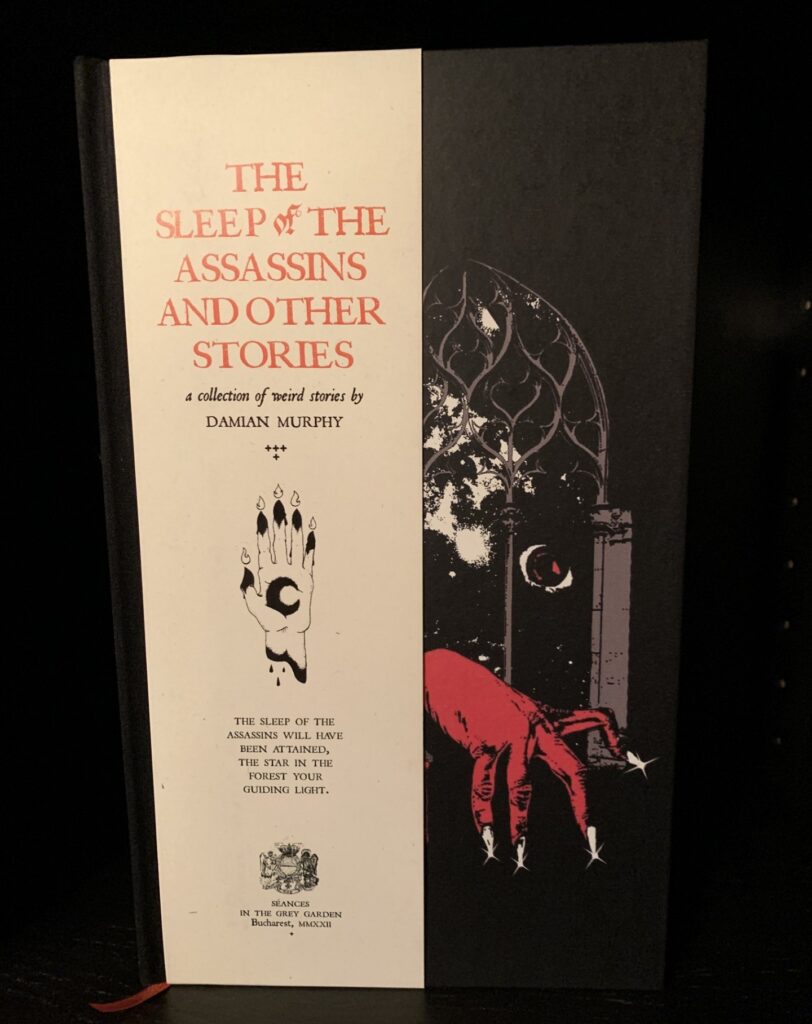
Who are some of your favourite writers, filmmakers, artists, and musicians?
…and what is it about their works that so inspire and move you?
Aside from Varo, Harry Smith has long been a source of inspiration for me. His life and work give the impression of raw, unfiltered genius.
Someone lent me a copy of American Magus over two decades ago and I ended up reading the whole thing over the course of two feverish nights, then immediately turned back to the beginning and read much of it again. Smith defined folk art. Everything about him, from his fascination with found paper airplanes to his meticulously constructed films, pointed back to the idea of pure creativity rising up from some ineffable source and finding expression through the untrained hand.
This particular source of inspiration provides a contrast to my fascination with cultivated arts and practices, modes of expression that require a high degree of expertise. I get the same thing from outré underground comic art, which is having a massive renaissance at the moment.
Clarice Lispector is an author I return to again and again. Her strength, above all else, lay in her willingness and ability to reveal modes of experience and behavior that nobody had ever written about. This is a huge component of my own writing, which is almost always concerned with drives and motivations that have no representation in the arts, experiences that aren’t recognized in the society I live in, and approaches to life that hardly anyone gives credence to.
So much importance in literature is placed on documenting common feelings and experiences, reflecting the voices of the masses, and addressing society’s concerns. I would rather do the exact opposite and reveal things that the reader has never seen or heard of before. This is what I generally look for in literature, in every kind of art. Of course, it’s essential that this is done with subtlety. Lispector’s writing provides a wealth of good examples.
Justin Isis has been a tremendous inspiration in recent years. He keeps inventing new kinds of literature.
We have a strange synergy between us. More than once, when discussing what we’ve been writing lately, we’ve found that, though the material is very different, our respective stories have shared an extremely unlikely common element.
Adam S. Cantwell is another author whose work I always read as soon as it becomes available. Cantwell has a way of making creative decisions that nobody else would ever make, but which always land perfectly. He never takes the same path twice. Everything he writes is a risk that somehow pays off. It’s uncanny.
How did you come to connect and become a key player in the international Neo-Decadent movement?
… and can you please outline the movement for those at home who may be unaware?
My first few published books were frequently referred to as decadent by a number of reviewers. This wasn’t something that I consciously aimed for and it took me a little by surprise. On the other hand, I’d always loved the authors associated with the decadent movement and appreciated the comparison.
When Justin Isis announced that he was collecting texts for the first Neo-Decadent anthology, Drowning in Beauty, I immediately came up with an idea. The result was “A Mansion of Sapphire,” my second occult retro-electronic-gaming story. It seemed to be fairly well received.
It took me a little while to fully understand the differences between the original decadent movement and Neo-Decadence. The latter is a multi-faceted beast of notable subtlety and complexity. I’ve seen people criticize it for being too general and ill-defined, or for being a clone of the original decadent movement, which, in my mind, speaks to a lack of engagement with the material.
Neo-Decadence is something that must be grappled with on an individual level. I think everybody’s ultimate definition will be a little bit different. For my part, it has a lot to do with unfettered creativity, a very strong reaction against the protestant work ethic that dominates so much of the modern world, and a desire to embrace the world in ways that aren’t officially sanctioned by contemporary society – not so much because they’re taboo, but because they’re not utilitarian.
Any news, upcoming projects, or releases you would like to share?
I have a lot of unpublished material that should be coming out in the next year or so.
First up is a new collection, Saint Severina’s Fire, which collects some stories that were originally published in limited editions along with two sizable new pieces, one of them short novel-length.
Another short novel, Holy Living Creatures, should be coming out sometime after that.
There’s another collection coming out probably within the next year which will contain both reprints and new stories and which is being kept secret until it’s announced. There will be more after that – I have some new stories that aren’t slated for publication anywhere yet.
If people wanted to check out your stuff, work with you, or buy some of your wares – Where should they visit and how should they get in touch?
I have a web site named after a Robbe-Grillet book where I announce all my publications: https://golgonoozamancy.blogspot.com/ The URL imagines a type of divination based on the mythical city created by William Blake.
All my paperback collections can be found at the Snuggly Books website: https://www.snugglybooks.co.uk/ (You can also purchase them on Amazon and other online retailers).
Copies of my most recent hardcover book, The Explosion of a Chandelier, can be found at The Occult Press website: https://www.snugglybooks.co.uk/occult-press/
For rare, out of print, limited-edition hardcovers, Ziesing Books is the place to go: https://www.ziesings.com/advSearchResults.php?action=search&fromForm=1&authorField=Damian+Murphy
The Occult
Please explain what ‘the occult’ means to you – in both a religious and aesthetic sense?
The literal meaning of occult is ‘hidden’, which I think perfectly encapsulates everything about it.
Occult experiences don’t generally come easy; they have to be sought out, which usually involves quite a bit of work in order to develop the necessary skills and to hone certain perceptive abilities. These abilities come naturally to some people, but it’s rare, and even when they do a certain amount of discipline or tradition is needed in order for them to really flourish.
By tradition, I don’t necessarily mean an officially recognized tradition – it can be something as obscure as a practice handed down from one person to another. Information on occultism is everywhere these days, but experiencing it at any real depth is more than a matter of just following instructions. On the other hand, if you follow an instruction far enough, even if it’s based on faulty premises, you’ll stand a good chance of forging a key that will lead to something worthwhile.
Crowley emphasized work about all else, even if you have to work blindly. There’s definitely something to that.
Religion, occultism, magic – these terms are all very difficult to define in any complete way without oversimplifying to the point of meaninglessness. There’s something very Mercurial about all of them. They resist precise definition. Whenever you try to pin them down to a set of ideas or phenomena, you’ll find that you’ve left something crucial out. This quality is part of what makes them so valuable.
Even after you’ve mastered an occult practice, there will always be something about it that remains hidden, at least if you keep pushing forward with it.
In an aesthetic sense, occultism is so open to interpretation that I hesitate to limit it in any way. I think I may have managed to write about occult wallpaper in my story Seduction of a Golden Pheasant, though there’s nothing stereotypically occult about it.
I often make use of metaphors of luxury in my writing, which I think has led a lot of readers to assume I’m promoting Epicurean values.
Luxury is almost always an indication of spiritual ecstasy in my fiction, while decrepit environments indicate another kind of experience, equally desirable. I’ve found that, by allowing the reader to feel immersed in a particular environment, they can be led to a purely intuitive understanding of certain states of being and certain principles. This seems to bypass the rational mind. This works better with some readers than others, though I was initially surprised at how many people responded to it.
People often associate occultism with horror, but that’s never been my experience of it. If I were going to compare it to a literary aesthetic, I’d choose Lawrence Durrell over Lovecraft.
Can you please outline what your current religious practice / practices involve?
My practice varies over time, depending on what’s needed. I do a lot of work with various spirits and deities, invoking them, calling them forth, communing with them, receiving visions. For a good two decades, I used modified versions of The Bornless Rite on a very regular basis, often in combination with other work – talismanic consecration, visionary work, and the like.
I think I may have finally exhausted that particular rite, though it’s amazing how much mileage I got out of it over the years. Like any good general-purpose rite, it’s extremely adaptable.
For several years, I’ve been holding a monthly Eucharistic ritual involving an invocation of the powers of whatever zodiacal sign the sun has just passed into. It’s an invite-only event. At any given time there’s a small core of people involved in these rites. We’ll do a fervent invocation and charge up a bottle of wine with the powers invoked, call forth the spirits of the sign and drink the consecrated Eucharist.
The result is generally a profound connection to the zodiacal power, instruction from the spirits, and a visionary perception of the archetype. Different people tend to tap into different aspects of it.
My practice has always been very religious in nature, always going toward a deeper understanding of, and engagement with, the ineffable, whether this is approached as a single, all-encompassing Absolute or as a company of gods and spirits, whether through the celestial or the chthonic, whether in relation to myself or to my environment.
The pursuit of the hidden is the absolute key, always at a progressively greater depth. I think this is impossible to explain to anyone that doesn’t have similar motives.

What does God mean to you?
I’m sympathetic to the notion of the Absolute in the sense that the Kabbalists of 13th century Spain understood it, especially with the notion of Ain Soph – impersonal, ineffable, beyond any question of being or non-being, infinitely adaptable to whatever notion you might want to project upon it, yet ultimately beyond all conception.
I’ve always resonated with Crowley’s Liber AL (ie: The Book of the Law). Crowley’s book defines God as two-fold, first as Nuit, or infinite expansion, ‘the naked brilliance of the voluptuous night sky’, and second, as her counterpart and lover Hadit, or infinite contraction, which lies at the heart of every conscious being and which can’t be directly known.
Of course, this is all just another projection, another way of dealing with something that can’t be restricted to any definition whatsoever. Every religion is arbitrary in a sense – if you’re going to consciously approach the ineffable, you’re going to need a strategy, and that strategy is always going to be arbitrary. It’s important to choose one that you can adapt to.
Odds & Ends
If you could live in any place, during any historical era – When and where would that be?
… and why would you choose that time and place?
New York between the 1950s and 1970s comes to mind. Rent was insanely cheap in those days! You could live on almost nothing, and as a result the arts were constantly flourishing in new and unexpected ways. I’m not talking about people like Warhol or Jackson Pollack as much as Harry Smith, Ed Sanders, Jack smith, Morton Feldman, John Zorn – for a long time, underground art in New York was like a force of nature. Now, unfortunately, I couldn’t imagine someone like Harry Smith living on next to nothing in the Chelsea Hotel.
If you had to sum your long-term home state of Washington, USA up in one object – What would it be?
Why did you choose it?
I don’t know if I can speak for all of Washington, but, to my mind, the soul of Seattle is encapsulated in a ride-through haunted house that used to be found in the ‘Fun Forest’ in the Seattle Center. The ride was titled Flight to Mars and was apparently part of the original 1962 World’s Fair.
That thing was so amazing I can’t even believe it, the perfect combination of perplexing mediocrity and visionary creativity. Rhino masks hanging from chandelier-lit ceilings, gasoline barrels tilting over the carriage, vampiric hamburgers and french fries with bloody fangs and flapping arms – I used to regularly make LSD-soaked excursions through the attraction in my youth.
I must have been seven or so the first time I rode on it. My dad went with me and I kept my eyes clenched shut the entire time. Afterward, I kept asking him what his favorite parts were in an attempt to ferret out what I’d missed.
I still dream about that thing on a more or less regular basis, though in my dreams it’s usually located in the Seattle zoo and is a hollowed-out shell, though the fascination it exerts has only increased. Somehow, in its decrepit and mostly empty state, it’s even more visionary and baffling than it was in my waking life. It feels as if I’m exploring the soul of the ride, which in turn comprises an essential component of the soul of the city.
Last I heard, Flight to Mars has been relocated to Texas and is still operational, and yet I’m convinced that something of the ride remains here, if only in the form of an etheric double.
… and how does it represent Washington, to you?
I don’t think that can really be put into words. There’s a whole aspect of the city that rarely becomes known outside of Washington. A lot of people that move here from other places remain unaware of it.
Seattle was known for the grunge thing in the early 90s, but The Sun City Girls moving here from Arizona in 1993 was far more indicative of the city’s true nature.
Please describe your last dream in detail…
I’ll describe a dream I had about a week ago.
I was drinking with an ex-girlfriend in a bar. She was scrutinizing a current astrological chart.
Somehow, in the dream, countries were able to move through the zodiac in the same way as the wandering stars. She pointed out that Canada was exactly on the midheaven and asked what I thought of that. I pointed out that Canada contained a paradox – on the one hand, it conveyed an image of proud uprightness and innocence, while on the other, it contained cold, uninhabitable, and mysterious regions in its north.
At some point, David Bowie came in and sat down with us. I don’t know why, but I’ve been dreaming about Bowie an awful lot lately. He had some kind of electronic device with him that emitted a kind of magnetic wave.
I told him I’d just been dreaming about him. “Oh yeah?” he said. “What era?” I realized that I’d dreamed of an entirely undocumented Bowie persona from sometime in the 1970s, a persona so secretive and elusive that even he didn’t know about it. He was fascinated as I described it to him.

Do you have a ‘day job’?
If so, what is it?
… and what impact does it have on your creative life?
One whole aspect of my writing is concerned with subversive activities on the job – everything from absurd pranks to out-and-out sabotage. The subject has always fascinated me.
When I was young, I was absolutely obsessed with this. My goal was to turn work subversion into a high art. Now, I’m more concerned with the idea of a literary genre entirely devoted to the most minor acts of transgression possible – work evasion, reverse shoplifting, modification of store window displays, etc.
I’ve spent a lot of time writing on the clock (to be fair, it’s not unusual for me to spend time doing job-related tasks off the clock). I suspect the act of engaging in non-work-related activity while on the job is an unspoken tradition. I could imagine an ever-evolving array of secret guilds dedicated to this, operating entirely by word-of-mouth, complete with ceremonial initiations, perilous ordeals, invisible hierarchies, and spirit guidance.
I wrote about something very similar in a novella published several years ago titled The Axis of the Lodestone.
Does sex change everything?
In my view, sex doesn’t change much.
Intimacy, on the other hand, can be extremely potent. That can change everything.
Of everything you have done so far, what would you most like to be remembered for?
The writing is the only thing that really makes sense in that context.
The teaching isn’t supposed to be traced back to me – it’s more about the development of other people, with the exception of the system of teaching itself, which was developed not by me but by my teachers. Teaching has had a profound impact on me – easily as much as it has on the people I’ve taught.
It’s nice to think that the writing might be remembered, but then even if it’s entirely forgotten, it seems to have had a favourable impact on some people’s lives, which could be enough. One generally wants to have an impact, to “leave your thumbprint on the world” as Morrissey once so eloquently put it, though it’s important to remember that you don’t get to control the impact of your work. Trying to control it is futile and takes attention away from the work itself.
If you’re lucky, you can kindle a light in the darkness of being. Maybe even a light with several facets. It will burn for a while, then eventually go out. This does not diminish its value in the slightest.
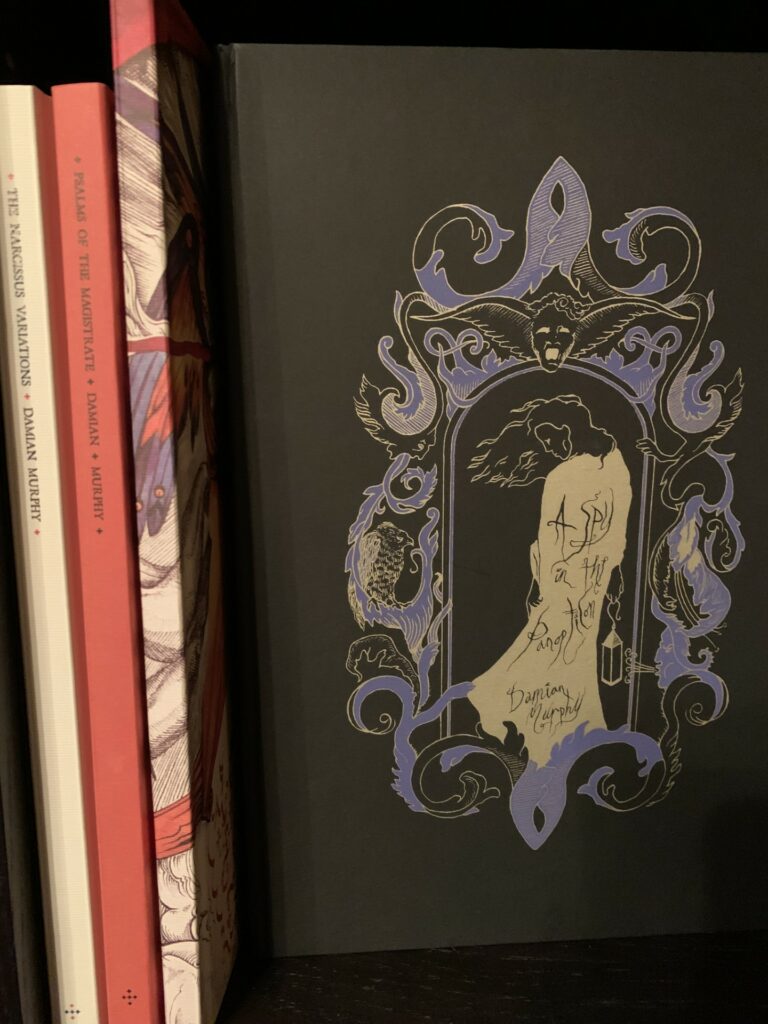
Links
- Damian Murphy – Blog
- Damian Murphy – twitter
- Damian Murphy – Instagram
- Damian Murphy – Facebook
- Damian Murphy – Email: bovineinversus@hotmail.com
- Damian Murphy – GoodReads Entry
- Damian Murphy – 2019 Interview with Justin Isis via Justin’s blog
All images supplied by Damian or sourced online.
